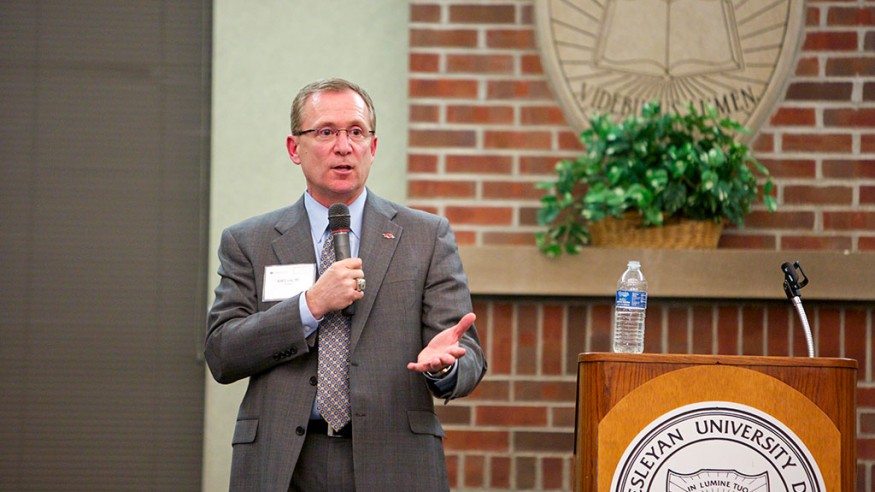
Ensuring Athletic Integrity and Educational Success
Jeff Long ’82: “Ethics is good business.” (Photo by Mark Schmitter ’12)
The Benes Room at the Hamilton-Williams Campus Center was full as alumnus Jeff Long returned to his alma mater to deliver the 11th annual Heisler Business Ethics Lecture. A Kettering, Ohio, native, Long is vice chancellor and athletic director at the University of Arkansas. With more than two decades in athletic administration at the Division I level, Long works both in the classroom and on the field to ensure athletic integrity and educational success for the university’s student-athletes.
In introducing Long, President Rock Jones mentioned that from his “dual perspective as president of his alma mater and a native of the state in which he now lives and works … I have gained great admiration and respect for his leadership and his accomplishments.
“In a world where it is tempting to think that winning at all costs defines success in every measure, Jeff Long arrives at work each day with a commitment to the well-being of the student-athlete in all aspects of the student experience. … Along the way, he has had to make profoundly difficult decisions. … [He has been able to do so] because of a foundation of ethical values. I can’t help but wonder if the defining difference between Jeff Long and others in his profession is that [he] was formed in the Division III environment with the foundation of the liberal arts as his primary base.”
The core of that ethical base, Long said in the lecture, is knowing who you are, as well as knowing what you stand for and what you will not stand for.
Long’s most public ethical decision came about a year ago when he fired Bobby Petrino, the Razorbacks successful and popular coach for “unethical behavior.” Petrino was “loved and revered throughout the state,” Long said, but after Petrino was involved in a motorcycle accident, events unfolded that exposed the coach’s extramarital affair and his hiring of the woman with whom he was involved—and giving her a $20,000 gift.
Long said it was widely reported that Petrino was fired for an extramarital affair, but that was inaccurate. “He hired the woman as a member of his staff without disclosing the relationship, which was a direct conflict of interest,” Long said. He mentioned that 156 people applied for the job for which the woman was hired. After uncovering additional deceitful statements about the accident itself, Long found himself in a place where “I could no longer trust a man to whom I entrusted the lives of 122 student-athletes.”
Once he knew all the facts, the decision to let Petrino go was not difficult, Long said, but the 10-day aftermath was arduous, as allegations were investigated and results report to the chancellor, the president of the university system, and the board of trustees. “But they showed great leadership at all levels,” never wavering in their support of the decision to fire the coach, even though many probably were under pressure to think of another solution. It was managing the fallout in public relations and in human relationships, particularly with the football team, that was the tough part, Long said, choking up a bit.
On a practical level, Long said, “Ethics is good business.” While many felt that fundraising efforts at the University of Arkansas would dry up following the firing, in fact, the annual fund broke a record and two donors stepped forward with large gifts to support the decision. A $40 million football complex also was funded. “In 2013, we will break the [annual fund] record again,” Long said. “[On the other hand], Penn State, which showed some lapses in leadership and integrity, will suffer financially.”
In the lively question and answer period following the presentation, Long discussed the recent firing of Mike Rice from Rutgers; the impact of Super Conferences; the “one and done” situation in some college sports; and the money that is part of athletics programs at large universities. The complete lecture is available at StreamOWU.
